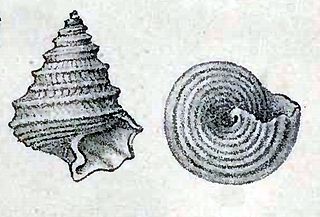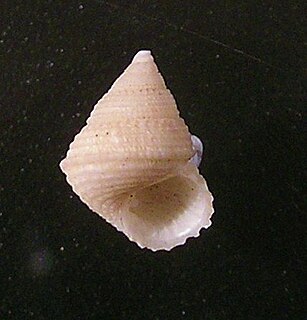
Empusa is a genus of mantises in the family Empusidae, containing the following species:

The spot-winged monarch, or spot-wing monarch flycatcher, is a species of bird in the family Monarchidae. It is found in Indonesia and Papua New Guinea. Its natural habitat is subtropical or tropical moist lowland forests.

Granulina is a genus of minute sea snails, marine gastropod mollusks or micromollusks in the family Marginellidae.
Nicrophorus guttula is a burying beetle described by Motschulsky in 1845.

Seguenziidae is a family of very small deepwater sea snails, marine gastropod mollusks in the superfamily Seguenzioidea.
Chroomonas is a genus of cryptophytes first described by Anton Hansgirg. It includes the species Chroomonas elegans, Chroomonas placoidea, Chroomonas baltica, Chroomonas guttula and Chroomonas vectensis.

Seguenzioidea is a superfamily of minute to medium-sized sea snails, marine gastropod mollusks in the clade Vetigastropoda.
Guttula galatheae is a species of sea snail, a marine gastropod mollusk in the family Seguenziidae.
Guttula is a genus of sea snails, marine gastropod mollusks in the family Seguenziidae.
Granulina guttula is a species of very small sea snail, a marine gastropod mollusk or micromollusk in the family Marginellidae.

Brasilennea guttula is a fossil species of air-breathing land snail, a terrestrial pulmonate gastropod mollusc in the family Cerionidae, from the Paleocene Itaboraí Basin, Brazil. Brasilennea guttula shows a peculiar shell shape, distinct from the other species in the genus; the shape is reminiscent of a water drop, which led to the specific epithet of Brasilennea guttula.
Guttula blanda is a species of extremely small deep water sea snail, a marine gastropod mollusk in the family Seguenziidae.
Anacrusis guttula is a species of moth of the family Tortricidae. It is found in Napo Province, Ecuador.

Sybra is a genus of beetles in the family Cerambycidae, containing the following species:

Sybra umbratica is a species of beetle in the family Cerambycidae. It was described by Pascoe in 1865.
Sybra uenoi is a species of beetle in the family Cerambycidae. It was described by Hayashi in 1956. It is known from Japan.
Sybra bioculata is a species of beetle in the family Cerambycidae. It was described by Pic in 1925. It contains four subspecies: Sybra bioculata bioculata, Sybra bioculata quadrinotata, Sybra bioculata sikkimana, and Sybra bioculata tigrina.

Sybra ordinata is a species of beetle in the family Cerambycidae. It was described by Bates in 1873.
Sybra pascoei is a species of beetle in the family Cerambycidae. It was described by Lameere in 1893.
Catorhintha guttula is a species of leaf-footed bug in the family Coreidae. It is found in the Caribbean, Central America, North America, and South America.










